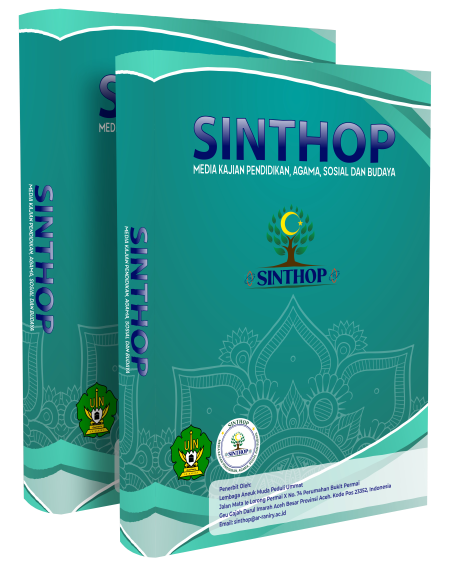Accelerated Learning: Antara Idealitas dan Realitas
DOI:
https://doi.org/10.22373/sinthop.v2i1.2931Keywords:
Proses Pembelajaran, Model Accelerated Learning, Implikasi PsikologisAbstract
One model that aims to accelerate the learning process is the accelerated learning model. This learning model, with its unique principles, aims to achieve better learning outcomes in a shorter period of time. However, it turns out that the accelerated learning model does not work well. The education system in Indonesia allows for large class sizes, with about forty students per class. With the varying conditions of the students, the accelerated learning model will have different consequences, both positive and negative. Therefore, in order to understand the psychological impact of this model on students during the learning process, this research needs to be conducted. This study is a qualitative research that uses a critical analytical approach and aims to critique the accelerated learning model. The data used consists of open-ended questionnaires and relevant literature. This study focuses on the psychological implications of the accelerated learning model on students. Based on the research findings, it is known that the positive impact of the model is that students will feel motivated and confident in completing additional tasks. However, the negative impact is that it can lead academically high-achieving students to not appreciate their lower-performing peers and create jealousy among them.
Abstrak
Salah satu model yang bertujuan untuk mempercepat proses pembelajaran adalah model accelerated learning. Model pembelajaran ini dengan prinsip-prinsipnya yang unik bertujuan untuk mencapai hasil belajar yang lebih baik dalam waktu yang lebih singkat. Ternyata model accelerated learning tidak berjalan dengan baik. Sistem pembelajaran di Indonesia memungkinkan rombongan belajar, atau jumlah siswa per kelas, sekitar empat puluh siswa. Dengan kondisi siswa yang bervariatif, model accelerated learning akan memiliki konsekuensi yang berbeda, baik positif maupun negatif. Oleh karena itu, untuk mengetahui dampak psikologis model tersebut terhadap siswa dalam proses pembelajaran, penelitian ini harus dilakukan. Penelitian ini adalah penelitian kualitatif yang menggunakan pendekatan analitis kritis dan bertujuan untuk mengkritik model accelerated learning. Data yang digunakan adalah angket terbuka dan literatur terkait. Penelitian ini berfokus pada implikasi psikologis model accelerated learning terhadap siswa. Berdasarkan hasil penelitian, diketahui bahwa dampak positif model tersebut adalah siswa akan merasa termotivasi dan percaya diri untuk menyelesaikan tugas-tugas tambahan. Namun, dampak negatifnya adalah membuat siswa yang kemampuan akademisnya tinggi tidak menghargai teman yang lebih rendah dan menimbulkan kecemburuan di antara mereka.
References
dok.com. (2013). Rekrutmen Guru Kelas Akselerasi dan Unggulan. https://123dok.com/article/rekrutmen-guru-kelas-akselerasi-dan-unggulan.q2n1mxwe
Ariesta, F. W. (2021). Hakikat Teori Multiple Intelligences dalam Pembelajaran (Howard Gardner) – Pendidikan Guru Sekolah Dasar. https://pgsd.binus.ac.id/2021/12/07/1372/
Hafil, M. (2014). Kemendikbud hapus program akselerasi. Republika.Co.Id. https://www.republika.co.id/berita/nd6cab10/kemendikbud-hapus-program-akselerasi
Hamid, I. (2019). Pengembangan Model Bimbingan Belajar Accelerated Learning Untuk Meningkatkan Motivasi Belajar Siswa Di Sma Negeri 1 Sinjai Kabupaten Sinjai. Jurnal Mimbar Kesejahteraan Sosial, 2(2), 16–29.
orami.co.id. (2023). 8 Ciri-Ciri Anak Akselerasi yang Punya Kecerdasan Tinggi. https://www.orami.co.id/magazine/ciri-ciri-anak-akselerasi
Purnami, R. S., & Rohayati, R. (2016). IMPLEMENTASI METODE EXPERIENTIAL LEARNING DALAM PENGEMBANGAN SOFTSKILLS MAHASISWA YANG MENUNJANG INTEGRASI TEKNOLOGI, MANAJEMEN DAN BISNIS. Jurnal Penelitian Pendidikan, 13(1). https://doi.org/10.17509/jpp.v13i1.3511
Rahmiati, & Neviyarni. (2021). Teori Belajar Accelerated Learning dalam Meningkatkan Motivasi Belajar. Jurnal Pendidikan Tambusai, 5, 255–260. https://www.jptam.org/index.php/jptam/article/view/941
Rohani. (2015). Penerapan accelereted learning dalam meningkatkan hasil belajar matematika siswa pada topik aritmatika sosial di kelas VII MTs islamiyah gunting saga kecamatan kualuh selatan kabupaten labuhan batu utara. JURNAL PEMBELAJARAN DAN MATEMATIKA SIGMA, 1(2).
sc.syekhnurjati.ac.id. (2023). Modul Perkuliahan: Pertemuan Ke 13. https://sc.syekhnurjati.ac.id/esscamp/files_dosen/modul/Pertemuan_13PAI_5220959.pdf
Tafsir Ibnu Katsir. (2015). Tafsir Surat Al-A’raf, ayat 31. May 13, 2015. http://www.ibnukatsironline.com/2014/08/tafsir-surat-al-baqarah-ayat-31.html
Tin, S. (2006). Menerapkan Model Accelerated Learning dalam Pembelajaran Akuntansi: Sebuah Pedoman untuk Dosen-Dosen Akuntansi. Media Riset Akuntansi, Auditing & Informasi, 6(2), 139–154. https://doi.org/10.25105/mraai.v6i2.915
Viva.pressbooks.pub. (n.d.). Chapter 2: Influences on Learning: Student Differences and Similarities – Foundations of American Education: A Critical Lens. Retrieved May 4, 2023, from https://viva.pressbooks.pub/foundationsofamericaneducation/chapter/chapter-2/
WartaGuru.ID. (2022). Mengenal Program Kelas Akselerasi dalam Sistem Pendidikan di Indonesia -. https://wartaguru.id/mengenal-program-akselerasi-dalam-sistem-pendidikan-di-indonesia/
Downloads
Published
How to Cite
Issue
Section
License
Authors who publish in SINTHOP: Media Kajian Agama, Sosial dan Budaya agree to the following terms:
- Authors retain copyright and grant the journal right of first publication with the work simultaneously licensed Attribution-ShareAlike 4.0 International (CC BY-SA 4.0) that allows others to share the work with an acknowledgment of the work's authorship and initial publication in this journal.
- Authors are able to enter into separate, additional contractual arrangements for the non-exclusive distribution of the journal's published version of the work (e.g., post it to an institutional repository or publish it in a book), with an acknowledgment of its initial publication in this journal.
- Authors are permitted and encouraged to post their work online (e.g., in institutional repositories or on their website) prior to and during the submission process, as it can lead to productive exchanges, as well as earlier and greater citation of published work. (See The Effect of Open Acces)



.png)

.png)
.png)
.png)


